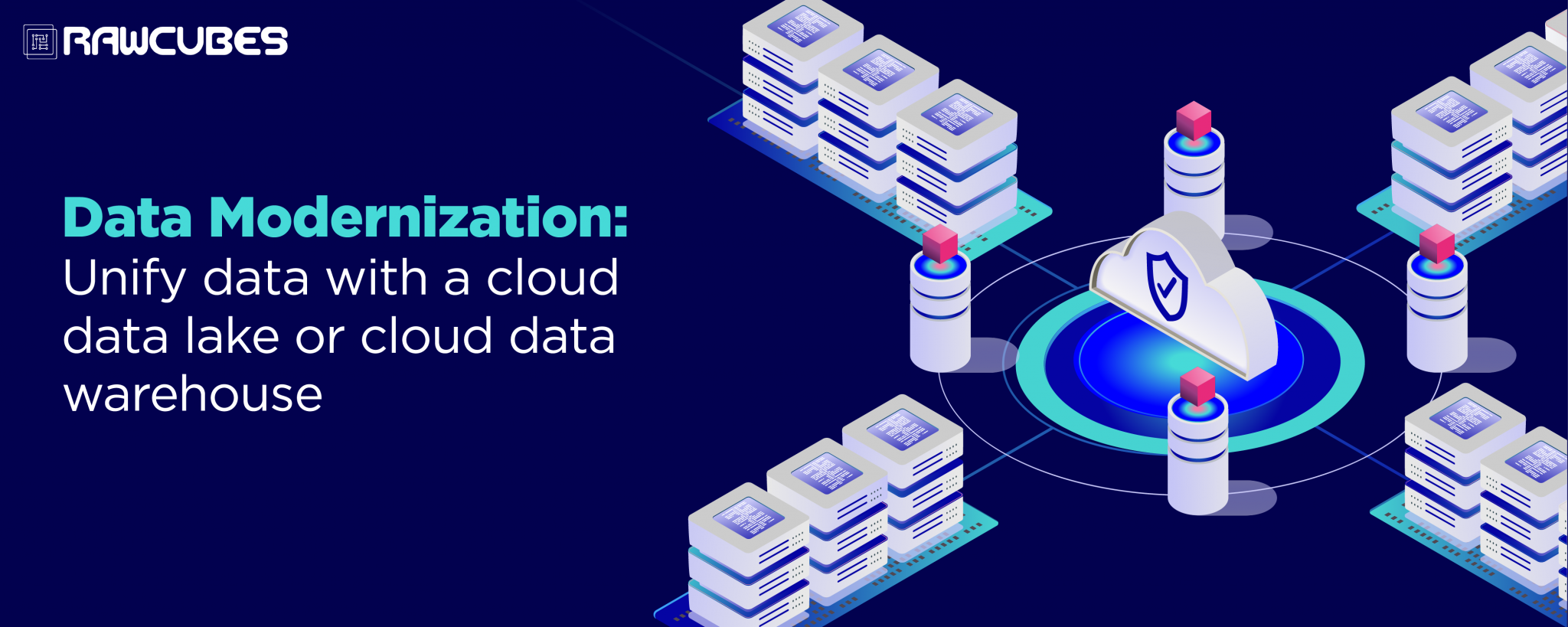Data Modernization: Unify data with a cloud data lake or cloud data warehouse

Enterprises are adopting data modernization strategies for a number of reasons, but the competitive advantage is often seen as the key motivator. By moving legacy applications to the cloud, leading companies are not only able to improve their bottom line but also get a leg up on the competition. Nowadays we all know that data drives the day-to-day functions of businesses, from creating personalized programs for customers to optimizing operational processes. In addition, organizations use data as a leverage point to increase their revenue and profits. However, finding the best way to manage your data that fits your needs is difficult.
There are many types of data repositories that serve the needs of businesses. Let’s look at the two main types of cloud storage repositories that exist today — cloud data lakes and data warehouses. Data modernization or transferring data to modern cloud-based databases from outdated or siloed legacy databases is the need of the hour in such dynamic times of surplus data. Organizations rely on effective and agile cloud-based data storage for both day-to-day businesses and to accomplish specifically defined tasks.
The two different types of cloud data storage exhibit different purposes to address specific needs:
Cloud Data Lake:
Cloud data lake is perfect if the data is collected and stored in both structured and unstructured forms. It is not altered to fit a specific purpose or particular format. These data lakes are perfect resources for firms that store crime-related information, unstructured, demographics, and outages. Most businesses prefer cloud data lakes over data warehouses because of improved performance, reduced costs, and optimized analytics.
Cloud Data warehouse:
A cloud data warehouse is crucial because it is programmed to apply a uniform format, making it easier for decision-makers in business to analyze and share insights with their colleagues. It also allows the company owners to access their historical activities quickly and evaluate which initiatives were successful in the past. Deploying a data warehouse with a cloud makes it faster and also makes it easier to increase their data storage with just a click, which is complex and slower in on-premise data warehouses.
Key differences: cloud data lake vs. cloud data warehouse?
The basic function of cloud data lake and cloud data warehouse repositories is to store data, but there are distinct differences between them. For instance, a cloud data lake is a large data aggregation and is typically more cost-effective to implement because it is largely unstructured.
On the other hand, a cloud data warehouse contains a small amount of data comparatively. The data within the cloud data warehouse is categorized for specific use by a business unit and improves the efficiency of accessing various data sets. It makes it easier for corporate decision-makers to drive insights and guide business & marketing strategies.
Top 5 benefits your business can achieve with a cloud data lake and cloud data warehouse
Every business is unique with particular targets, goals, and challenges. Therefore, you must evaluate which solution is best for you to serve your organization’s business needs aptly. There are several benefits that businesses can achieve using a cloud data lake or cloud data warehouse. Here are five of them:
Cloud Data Lake
- Affordable option to store varied data in large quantities.
- Perfect for storing unstructured data like Twitter in the B2C space (they have threads (Tweets), images, videos, direct messages, live Streams, etc.)
- can be stored in any format eliminating the resource heave requirements of data modeling during the data ingestion.
- If you need to collect data first and then analyze it later. In this context, a cloud data lake would be best.
- Maximizes data value and security while also minimizing data liability.
Cloud data warehouse
- It comes with a lower cost of ownership compared to traditional storage because the cloud data warehouse allows business purchase as little or as much storage or compute power as needed.
- Increased data storage means the cloud data warehouses can control the size of clusters, CPU, and RAM to fit the needs of specific projects without disturbing the company’s budget or architecture.
- Cloud data warehouses are fast and can handle multiple data streams at varying velocities.
- It comes with improved speed and performance.
- Cloud data warehouses make data accessible and available to users, which empowers them to make informed choices in every dimension of business.
Conclusion
Cloud data warehouses and data lakes are the future of data storage and management. When combined with Rawcubes, you have an opportunity to create the most comprehensive data and analytics experience for your business. We at Rawcubes offer several solutions to assist you with your data modernization needs. Cloud migration is becoming more and more of a standard today than an exception. Let us help you migrate data with confidence. Act on Real-time Insights with Rawcubes and schedule your growth today!